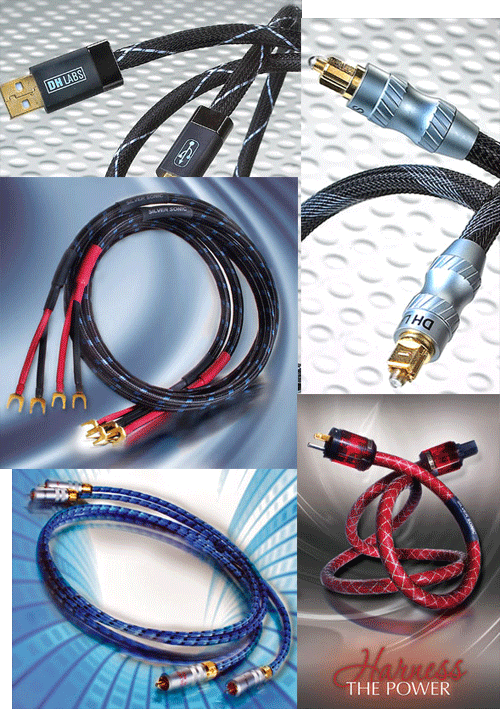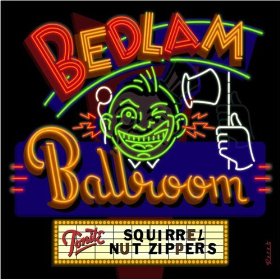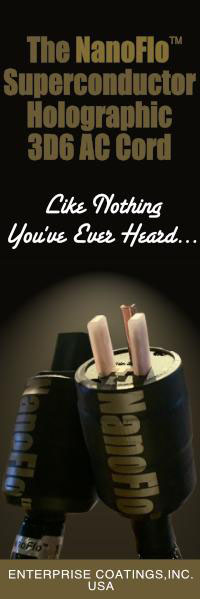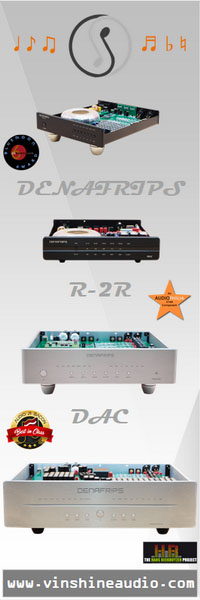DH Labs Silver Sonic Cables
|
DH Labs Silver Sonic Cables |
|
High-End Cables at Hot-Dog Prices |
|
|
|
February, 2012 |

It’s been a couple of decades since I came across a company called DH Labs. The company is headed by Darren Hovsepian, and makes high-quality cables for entry level prices. While DH Labs still produces very good entry level cables, they have now developed higher end cable products that can hold their own with any cables, in my experience. In addition, DH’s Silver-Sonic cables have garnered very positive reviews in the audio press. So when I received an e-mail from Darren Hovsepian offering to send me some of his upscale cable models for review, I didn’t hesitate.
In this review, I will touch on five different cable products from this:
* Silver Sonic Revelation interconnects; $499/1-meter pair
* Silver-Sonic Q-10 Signature speaker cables; $272/6-foot pair
* Silver-Sonic Red Wave AC cord; $750/1.5-meter
* Silver-Sonic USB digital cable; $70/meter
* Silver-Sonic Toslink Optical digital cable $45/1-meter
Preface: The Alles Theory of cable/system interactions
Over the years I have had the opportunity to experiment with quite a few different cable products. My results indicate that while there are some constants, in general, cable interactions within a system are tricky to predict. Pairing two unlike interconnects often gives a blend of the qualities of both cables, but as to what proportion of specific qualities you will end up with can be a craps shoot. And pairing two interconnects of the same brand and model often accentuates certain frequencies often resulting in brighter and brighter, or duller and duller sound. I believe that is why so many of us tend to mix and match.
Many times, when cabling a system I’ve taken handfuls of my favorite cables and then put them in the system in every possible combination and position just to see what produced the most transparent and balanced presentation. As you might imagine, this kind of trial and error can become quite tedious. But once you find that magical combination, it becomes worthwhile.
Now when pairing different types of cables together such as interconnects and speaker cables, or speaker cables and AC power cords, I always think of it as an “intake vs. exhaust” analogy. This means the incoming wire from your source component has to be compatible with the speaker cable that carries the output. This is where things get complicated and why results cannot be guaranteed by me or anyone else. The reviewer has no way of knowing what cable combinations you will employ, and your personal listening bias becomes part of the equation as well. How bright is too bright? How much bass is too much and how much is just right? How forward in the soundstage do you prefer your vocals and midrange instruments? Obviously, you must look for a cable combination that matches your sonic idealism as closely as possible.
My Sojourn
The first cables I installed in my reference system were the DH Labs Revelation interconnects. This was a 2-meter balanced pair with XLR terminations inserted between my preamplifier and amplifier. The Revelations feature six pure silver conductors in an interleaved helical array. Each conductor is individually insulated in an air-spaced, tape wrapped version of DH’s exclusive Air Matrix dielectric. The cable is covered with an attractive woven fiber jacket and painstakingly hand terminated with custom-machined RCA Plugs or balanced XLR connectors.
My first impressions of the Revelation interconnects were that the sound of instruments and vocals seemed better focused from top to bottom. The bass became tauter and the midrange took on a very realistic, immediate sound that breathed new life into brass instruments like trumpet and trombone and also to the human voice. Playing through a CD like  The Squirrel Nut Zippers’ Bedlam Ballroom [Mammoth Records MR 65502-2] proved insightful. I could hear more air around the vocals (the female vocals were especially engaging) and there was more micro-dynamic nuance and texture to the horns. Even the piano was improved. The Revelation cables seemed to grab more of the body and essence of a given instrument, thus making it sound more natural and alive. On cymbals I could hear more of the body of the cymbal being struck as well as the upper shimmer. This extra component of hearing more of the complete cymbal sound made my experience much more plausible and enjoyable.
The Squirrel Nut Zippers’ Bedlam Ballroom [Mammoth Records MR 65502-2] proved insightful. I could hear more air around the vocals (the female vocals were especially engaging) and there was more micro-dynamic nuance and texture to the horns. Even the piano was improved. The Revelation cables seemed to grab more of the body and essence of a given instrument, thus making it sound more natural and alive. On cymbals I could hear more of the body of the cymbal being struck as well as the upper shimmer. This extra component of hearing more of the complete cymbal sound made my experience much more plausible and enjoyable.
For whatever reason, I felt I was missing some of the extreme upper treble that I felt the Revelations were capable of producing. And I was pretty sure it was one of those intake vs. exhaust scenarios I mentioned earlier. Sure enough, when I inserted the Silver-Sonic Q-10 Signature speaker cables (taking out my Audio Metallurgy Golden Reference) the upper highs were there in spades, and so was everything else.
The sound-stage became immense, clear, and layered, and I believe I heard more of a vertical extension of the sound field than I had heard previously. This showed me that indeed the Revelation interconnects were in fact passing upper high frequency information. The Q-10’s are superbly dynamic and do very well at portraying instruments clearly, each in its own space. But over time, although some of my recordings sounded really great, I began to notice that a number of them became too bright for my taste.
I installed the DH Labs Red Wave AC power cord on my amplifier soon thereafter and found that the overall balance did not change much. It was a smaller change and I felt the sound became just perceptibly smoother at times with certain instruments. And possibly there was just a touch more brightness.
So a pattern was beginning to emerge. Although l loved the clarity and sonic performance of the DH Labs cables, it seemed with each successive Silver-Sonic insertion in my system the sound became incrementally brighter.
I tried another experiment whereby I removed the Red Wave AC cord (re-installed my MAC Sound-Pipes HC cord) and also reinstalled my Audio Metallurgy Golden Reference speaker cables. The sound was not bad with only the DH Revelation interconnects remaining, but I missed some of the excellent focus and intimacy that the other DH Labs cables had imparted to the sound.
On a hunch, I removed my reference optical Toslink cable and installed a 2-meter DH Labs Toslink Optical cable. For whatever reason, this particular combination, using the DH Labs Toslink cable and the DH Labs Revelation interconnects in concert with my other reference cables gave me my best result ever.
The results took me back to the time when I was running Acoustat 2+2 ESL speakers with custom-built tube servo-charge OTL amplifiers—so transparent and immediate was the sound. Playing through A GRP Christmas Collection (popular jazz-artist covers of traditional Christmas music) [GRD-9574], I was astounded and captivated by the beauty and realism I heard throughout the full audio spectrum, but especially throughout the crucial midrange. It was truly as good as being at a live event. The DH Toslink optical cable made my budget Pioneer transport sound more like a multi-thousand dollar high-end unit, but sans the multi-thousand dollar cost.
And the DH-Labs USB cable proved similarly fine at allowing my IBM Lenovo laptop to sound its very best when playing hi-res music files. The female vocals I played became breathier and sexier without excess sibilance or harshness. The presentation was simply marvelous. And I achieved similar results when I installed the DH USB cable in my modest home theater multi-channel system. This system uses a simple Onkyo TX-SR705 receiver powering Energy speakers and for the first time I heard the kind of immediacy one only hears from high-end systems. Considering the shamefully low price of the DH USB the bang-for-the-buck is huge.
I tried one other experiment involving the DH Labs Red Wave AC cord and the Revelation interconnects with RCA terminations. First I installed the Red Wave AC cord on my custom Tripath amplifier in my Magnepan system. Immediately I heard its signature sound; a bit of extra brightness in the upper midrange and highs. By itself, that was okay, but when I added the Revelation interconnects, again, the sound became a bit too bright for my taste.
My overall feeling is that the DH Labs Revelation interconnects contribute more positive qualities than does the Red Wave AC cord, so I removed the Red Wave AC cord and left the Revelation interconnects in position between my Ray Samuels Nighthawk phono preamp and VTL 2.5-TL tube line stage. This worked exceedingly well for me as it had in my larger reference system, so I left it at that.
Conclusions
All in all, my experience with the DH Labs family of cables was quite positive and eye-opening in some areas. While I was ultimately not as smitten with the Red Wave AC cord and the Q-10 speaker cables as I was by the other DH-cables, I can see where they should work very well in some systems.
As it is, I’m quite sold on the DH Labs Revelation interconnects, the DH Labs Toslink optical cable, and the DH USB. For my system and taste, these cables were the standouts and brought my system to new heights of musical splendor.
I heartily recommend the DH line of fine audio cables and note that they are priced quite low for their very high level of performance. Happy listening to all!

![]()
Manufacturer
D.H. Labs, Inc.
9638 NW 153rd Terrace
Alachua, FL 32615
Phone: 386-418-0560
Please visit the DH Labs Website for additional specs and information
website: www.silversonic.com
![]()
Don’t forget to bookmark us! (CTRL-SHFT-D)
Stereo Times Masthead
Publisher/Founder
Clement Perry
Editor
Dave Thomas
Senior Editors
Frank Alles, Mike Girardi, Russell Lichter, Terry London, Moreno Mitchell, Paul Szabady, Bill Wells, Mike Wright, and Stephen Yan,
Current Contributors
David Abramson, Tim Barrall, Dave Allison, Ron Cook, Lewis Dardick, John Hoffman, Dan Secula, Don Shaulis, Greg Simmons, Eric Teh, Greg Voth, Richard Willie, Ed Van Winkle, Rob Dockery, Richard Doron, and Daveed Turek
Site Management Clement Perry
Ad Designer: Martin Perry





Be the first to comment on: DH Labs Silver Sonic Cables